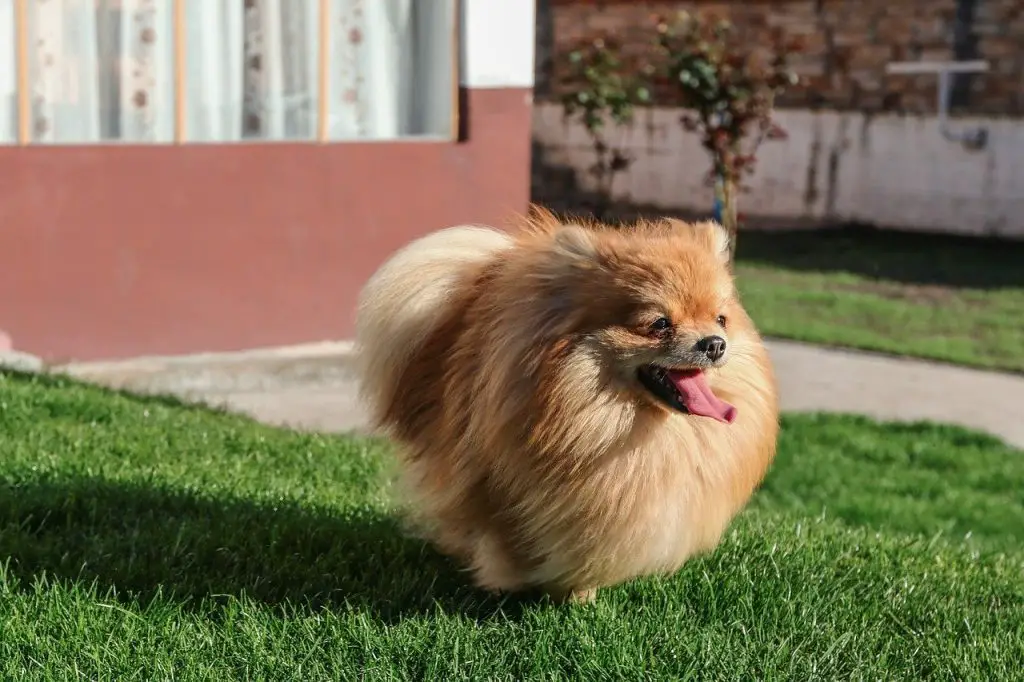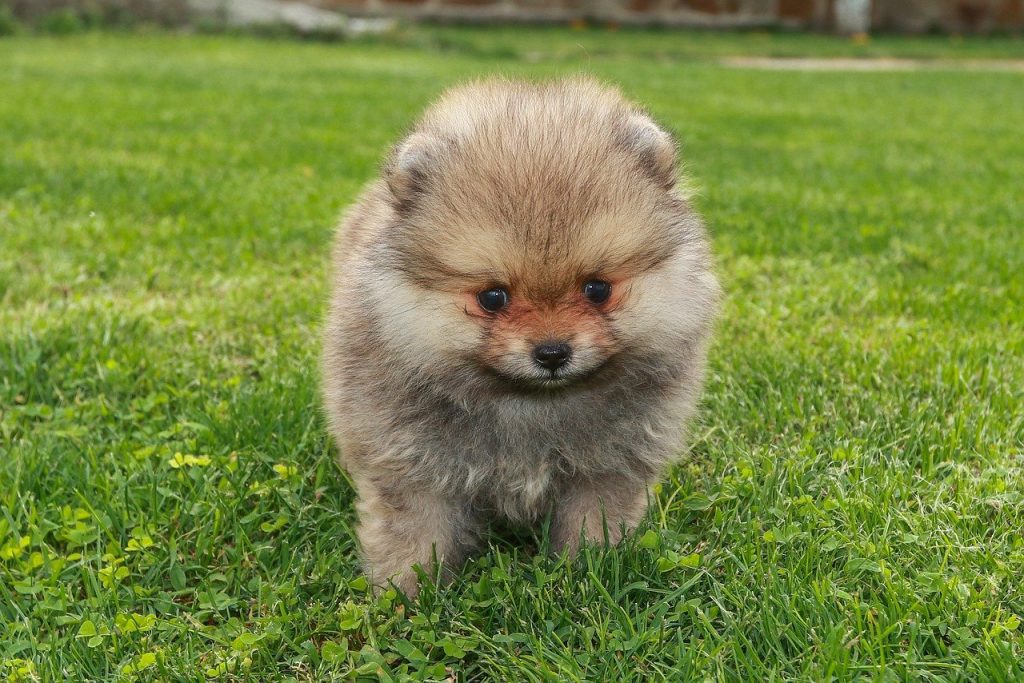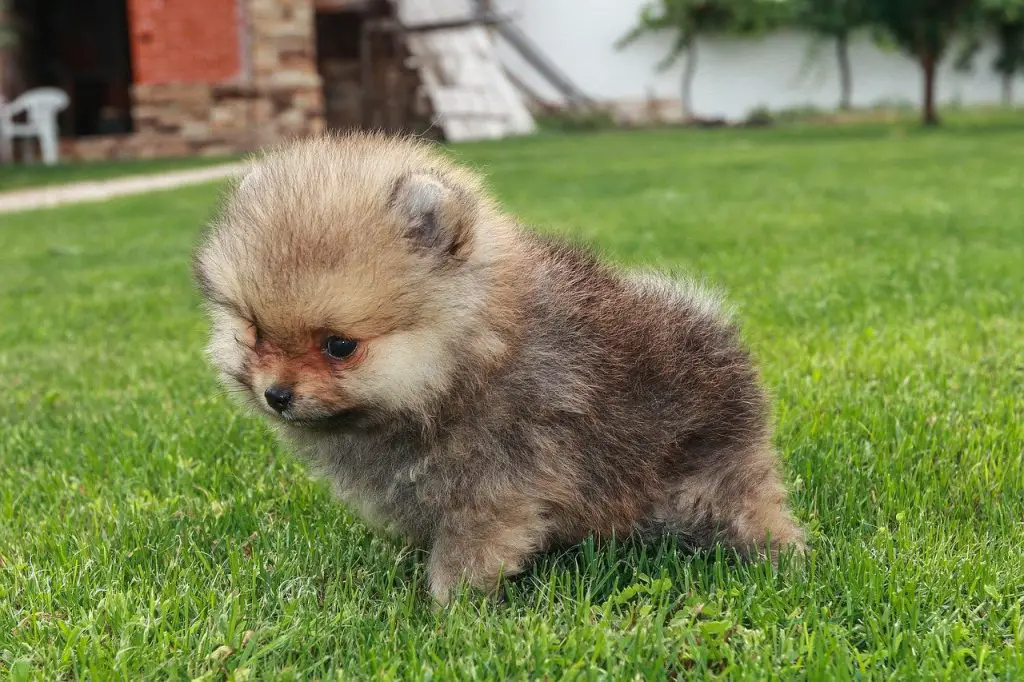Do you have a Pomeranian? If so, you may be wondering how often they pee. It’s definitely something that people think about when they are considering adding a Pomeranian to their family!
In this comprehensive guide, we will answer all of your questions about how often Pomeranians pee.
So, whether you are just curious or are actually planning to get a Pomeranian, read on for all the information you need!
- Key Takeaway
- How Often Do Pomeranians Pee?
- How Long Can a Pomeranian Hold Its Bladder?
- Why Do Pomeranians Pee So Much?
- How Do You Train a Pomeranian To Pee?
- FAQs
- Q: What should I do if my Pomeranian is peeing too frequently?
- Q: How can I potty train my Pomeranian to control their bladder?
- Q: Are there any specific signs that indicate my Pomeranian needs to pee?
- Q: Should I limit my Pomeranian’s water intake to reduce their peeing frequency?
- Q: How long can Pomeranians hold their pee?
- Q: My Pomeranian keeps having accidents indoors. What should I do?
- Q: Are female Pomeranians more prone to urinary issues and frequent peeing?
- Q: Can I train my Pomeranian to pee on command?
- Q: Does the age of my Pomeranian affect their peeing frequency?
- Conclusion and final thoughts
Key Takeaway
- Pomeranians, like most small breed dogs, typically need to urinate every 3 to 4 hours but puppies and older dogs may need to go out more frequently.
- A healthy adult Pomeranian can typically hold its bladder for up to 8 hours, while puppies can hold their pee for as many hours as they are months old, plus one.
- To train a Pomeranian to pee, it’s essential to establish a consistent schedule for bathroom breaks, use positive reinforcement when they pee in the right place, be patient and consistent in training, consider crate training, and consult a professional if needed.
How Often Do Pomeranians Pee?

On average, adult Pomeranians only need to pee once every six to eight hours whereas a puppy Pomeranian has to pee approximately every two hours. Of course how much Pomeranians pee depends on many factors including how much water they drink, how active they are, and whether or not they are potty trained.
Pomeranians are small dogs and as a result, they do not need to go outside as often as other breeds of dogs to pee. However, there is no set rule and some Pomeranians may need to go outside more frequently than others.
If you have an adult Pomeranian and are unsure how often your dog needs to pee, it is best to watch your dog’s behavior and take them outside when you notice they are starting to get restless. This will help prevent accidents in the house.
Generally, puppies Pomeranians pee about every two hours. However, this can vary depending on how much they drink, the weather, and their age.
If your pup has gone a while without peeing, it might be time to take them outside or give them access to their potty area.
If you have a puppy Pomeranian, it’s important to be aware of their bathroom habits and take them outside regularly to pee.
This will help them learn where to go and make potty training easier in the long run. Puppy Pomeranians should also be allowed to roam around freely in a designated potty area so they can get used to relieving themselves in that spot.
If you’re not home often, consider investing in a doggy litter box so your pup always has a place to go.
How Long Can a Pomeranian Hold Its Bladder?

Pomeranians can hold their bladder for an extended period of time, but the length of time depends on the dog’s age. For instance, a three-month-old Pomeranian can only hold its bladder for about two hours, while a six-month-old Pomeranian can hold its bladder for up to five hours.
A one-year-old Pomeranian can usually last eight hours before needing to relieve itself. By the time a Pomeranian is four years old, it can typically go up to twelve hours without having to pee.
There are two ways to determine how much pee a pup can handle. The first way is to weigh your Pomeranian and divide their weight by two. If your pup weighs 6 pounds, it can hold up to 3 ounces of urine before needing to pee.
However, I think the second way which is called the ”hour rule” is better. In general, Pomeranians can hold their bladder for one hour every month they are old and up to a maximum of twelve hours. So, let me do the math:
| Age of Pomeranian | Bladder Control Duration |
|---|---|
| 2 months old | 3 hours |
| 3 months old | 4 hours |
| 4 months old | 5 hours |
| 5 months and above | 6 hours |
| Adult | Up to 8 hours |
Why Do Pomeranians Pee So Much?

There are a few reasons why your Pomeranian may be peeing a lot, including dehydration, excessive drinking/water intake, UTI, diabetes, kidney disease, Cushing’s disease, and pregnancy.
However, if your Pomeranian is healthy and has none of the above medical conditions, simply limiting their water intake can reduce the number of times they pee during the day.
Urinating is the body’s way of getting rid of excess fluid, so if your dog is drinking and peeing more than usual, it’s likely because they’re trying to compensate for the extra fluid by getting rid of it through their urine.
If you’re concerned about your Pomeranian’s excessive urination, it’s best to take them to the vet so they can get checked out and determine if there’s an underlying health issue causing it.
There are a few different things that could be causing your Pomeranian to pee more than usual, and some of them are pretty common.
For example, older dogs often start drinking and urinating more because their kidneys aren’t working as well as they used to, and diabetes can also cause excessive urination. Other potential causes include bladder infections, kidney stones, and even prostate problems in male dogs.
If your Pomeranian is healthy, there are a few things you can do to help reduce the number of times he or she pees throughout the day. One way to do this is by limiting your dog’s water intake.
Try not to let him or her drink too much water before bedtime, and make sure that all water bowls are emptied after each use. You may also want to consider feeding your dog smaller meals more often throughout the day instead of one large meal. This will help keep your dog’s bladder from filling up as quickly says Pomeranian Org.
How Do You Train a Pomeranian To Pee?
Training a Pomeranian to pee involves consistent schedules, positive reinforcement, and patience.
Set a Regular Schedule
The first step in training a Pomeranian to pee is to set a regular schedule. This includes feeding times, playtimes, and bathroom breaks. By maintaining a routine, your Pomeranian will start to understand when it’s time to eat, play, and go to the bathroom. It’s crucial to take your Pomeranian out for bathroom breaks frequently, especially after meals, naps, and playtime.
Use Positive Reinforcement
Positive reinforcement is key to successful toilet training. Whenever your Pomeranian successfully goes to the bathroom outside, reward them with treats, praise, or a quick game. This helps them associate going to the bathroom outside with positive experiences, encouraging them to repeat this behavior.
Be Patient and Consistent
Patience and consistency are essential when toilet training a Pomeranian. Accidents will happen, but it’s important not to punish your Pomeranian as this can create fear and confusion. Instead, if you catch them in the act, calmly interrupt them and take them outside. Always clean up accidents thoroughly to remove any scent that could encourage them to go in the same spot again.
Crate Training
Crate training can be a useful tool when toilet training a Pomeranian. Dogs instinctively don’t like to soil their sleeping area, so using a crate can help teach bladder control. Make sure the crate is comfortable and only just big enough for them to stand, turn around, and lie down in. Take them out for bathroom breaks regularly and never leave them in the crate for longer than they can hold their bladder.
Consult a Professional if Needed
If you’re struggling to toilet train your Pomeranian or making little progress, it might be worth consulting with a professional dog trainer or a vet. They can offer advice tailored to your specific situation and help identify any potential issues that might be hindering the training process.
FAQs
Q: What should I do if my Pomeranian is peeing too frequently?
A: If your Pomeranian is peeing more frequently than usual, it may be a sign of a urinary tract infection or another underlying health issue. It is recommended to consult with your veterinarian to rule out any medical conditions and receive appropriate treatment.
Q: How can I potty train my Pomeranian to control their bladder?
A: Potty training is an essential part of teaching your Pomeranian to control their bladder. Start by establishing a regular routine for bathroom breaks, rewarding your Pomeranian for going in the designated spot, and being consistent with positive reinforcement and patience. Crate training can also be effective in assisting with potty training.
Q: Are there any specific signs that indicate my Pomeranian needs to pee?
A: Yes, Pomeranians, like most dogs, may exhibit certain signs when they need to pee. These signs include restlessness, pacing, sniffing the ground, circling, or scratching at the door. Keep an eye out for these behaviors to anticipate when your Pomeranian needs to go outside.
Q: Should I limit my Pomeranian’s water intake to reduce their peeing frequency?
A: It is important to provide your Pomeranian with access to fresh water at all times to prevent dehydration. Restricting their water intake may lead to health issues. Instead, focus on establishing a regular bathroom routine and monitoring your Pomeranian’s behavior to determine when they need to pee.
Q: How long can Pomeranians hold their pee?
A: Pomeranians, like other small breed dogs, have smaller bladders and, therefore, may not be able to hold their pee for extended periods. On average, they can hold their pee for about 4-6 hours. However, it is essential to provide them with regular bathroom breaks to prevent accidents.
Q: My Pomeranian keeps having accidents indoors. What should I do?
A: If your Pomeranian is having accidents indoors, it might be a sign that they need more consistent potty training. Make sure to reinforce the positive behavior of going outside and clean up any accidents promptly and thoroughly to remove any lingering scents that could encourage them to pee in the same spot again.
Q: Are female Pomeranians more prone to urinary issues and frequent peeing?
A: Female Pomeranians may be more susceptible to urinary issues such as urinary tract infections or bladder stones. These conditions can cause frequent peeing. It is important to monitor your female Pomeranian’s urinary habits and consult with a veterinarian if you notice any signs of discomfort or unusual behavior.
Q: Can I train my Pomeranian to pee on command?
A: Yes, it is possible to train your Pomeranian to pee on command. By using a specific word or phrase consistently when they are about to pee or while they are peeing, they can eventually associate that command with the action. Positive reinforcement and rewards can help reinforce this behavior.
Q: Does the age of my Pomeranian affect their peeing frequency?
A: Yes, the age of your Pomeranian can impact their peeing frequency. Puppies have smaller bladders and weaker bladder control, so they will need to pee more frequently compared to adult Pomeranians. Similarly, older Pomeranians may experience age-related bladder issues that can increase their need to pee.
Conclusion and final thoughts
In conclusion, Pomeranians are an adorable and popular breed of dogs that require patience and attention from their owners.
As mentioned in the blog post, they have a small bladder and therefore need to be taken out for bathroom breaks frequently throughout the day.
It is important to establish a routine and provide opportunities for them to relieve themselves regularly.




